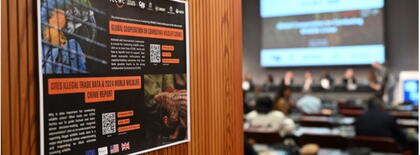Welcoming speech from CITES Secretary general (5 min.)
Excellencies, Heads of States, Ministers, Distinguished Guests, Ladies and Gentlemen.
It is a great pleasure for me to be here with you at this First High-level Conference on Illegal Wildlife Trade in the Americas.
We continue to see a great deal of high-level political support and cooperation at international and regional levels, and, in this regard, I would like to congratulate the Government of Peru for having organized this important conference in cooperation with their partners.
This is an excellent regional initiative, and the eyes of the world are upon us, encouraging our efforts to combat wildlife crime.
This Conference is a unique and special initiative to strengthen the region's commitment and determination to fight wildlife crime, building on our collective efforts since 2014 in London, Kasane, and Hanoi. All these efforts have played an essential role in maintaining and strengthening the momentum and political support in the fight against illegal wildlife trade.
CITES provides the basic legal framework for regulating the international trade of more than 36 000 animal and plant species in order to guarantee legal, sustainable, and traceable trade. Legal international trade can contribute greatly to achieving the Sustainable Development Goals, including the conservation of wildlife and the eradication of extreme poverty, which affects 1.3 billion people. Nonetheless, the illegal wildlife trade is highly detrimental and is often associated with devastating economic, social, and environmental impacts.
As confirmed by the 2019 Global Assessment Report on Biodiversity and Ecosystem Services, species and ecosystems worldwide continue to decline rapidly. A transformative change will be required to curb this trend, based on solutions that have proven to be effective.
A wide range of bilateral, multilateral, and philanthropic support means that we currently have more financial resources than ever before to tackle this problem.
There is also much better technical support at country level to promote targeted demand reduction strategies, as well as stronger enforcement, and I would like to highlight the choice of alternative livelihood opportunities, which is most important.
With regard to compliance, for example, we now have the International Consortium on Combatting Wildlife Crime (ICCWC), which provides coordinated support at national, regional, and global levels to assist authorities in tackling transnational organized crime. The Consortium, inter alia, provides support to facilitate application of the same tools and techniques used to fight other serious crimes.
The International Consortium on Combatting Wildlife Crime (ICCWC), which provides coordinated support at national, regional, and global levels to assist authorities in tackling transnational organized crime
SG Ivonne Higuero
The 18th meeting of the Conference of the Parties in CITES in Geneva adopted some bold decisions aimed at combatting the illegal wildlife trade. For example, a number of decisions were taken regarding the trade and conservation of jaguars. This emblematic species in the region, which was listed in CITES Appendix I in 1975, was recognized as a flagship species in its range countries, whereby the protection and conservation of the species and its habitat have become a joint priority. Now, it remains for us to adopt further specific measures to implement these Resolutions and Decisions.
The recent Resolution adopted by the United Nations General Assembly in September 2019 recognized the important role of CITES. The new Resolution reinforces the focus on key areas in the fight against the trafficking of wildlife, urging member States to strengthen the requisite laws and regulations to prevent, investigate, prosecute, and appropriately punish illegal trade, and to enhance strong responses in the field of enforcement and criminal justice.
Distinguished delegates, the CITES Secretariat is committed to providing the best possible support to the Parties to help them effectively comply with their obligations under the Convention. We all have an important role to play. All available political, financial, and technical support should be aligned and materialized in direct frontline support to ensure that all commitments under CITES are implemented.
Once again, I would like to thank the Government of Peru for hosting this Conference, and also the distinguished Delegates for their ongoing support and commitment to the survival of the world's wildlife.



